DFWatch – 25-31 July, 2015
Daghestan
The head of the Daghestani branch of the Russian Pension Fund Sagid Murtazaliyev is suspected of involvement in assassinations and financing terrorism. The assassinations include the killings of the head of the Kizlyar region’s gas service Dagestangazservis, deputy chief of the counter-extremism centre in the Interior Ministry of Daghestan, and the deputy head of Kizlyar municipal administration. Sagid Murtazaliyev was an influential person in Daghestani politics and was considered by many as Makhachkala mayor candidate or even the president of the republic before Ramazan Abdulatipov’s ascent to power. Murtazaliyev is currently in the United Arab Emirates and it is not yet clear whether he will be extradited to Russia. The charges against Murtazaliyev were followed by mass arrests of people from his closest circle, including Andrey Vinogradov, the head of Kizlyar region. Some analysts consider the charges as a way of weakening the ‘Avar clan’ in Daghestan, paving the way to replacing president Ramazan Abdulatipov. Both Abdulatipov and Murtazaliyevs are ethnic Avars.
Based on reporting by onkavkaz.ru and kavkaz-uzel.ru.
A man from the village of Gimry in the Untsukul region, who used to fight in Syria, became the new leader of the insurgency in the mountainous part of Daghestan on behalf of the Caucasian Emirate. The move is interpreted by some analysts as the Caucasian Emirate’s attempt to regain legitimacy among the insurgents in the light of growing popularity of the Islamic State that has begun to overwhelm the existing structures.
Based on reporting by kavkaz-uzel.ru.
Chechnya
A shootout between the security forces and the insurgency took place near the villages of Ilaskhan-Yurt and Mayrtup in the east of the republic on 28 July. The shootout lasted for an hour. There is no information regarding the casualties on either of the sides.
Based on reporting by kavkaz-uzel.ru.
Three Grozny women are suspected of having obtained money from the Islamic State under false pretences. The women allegedly received 200,000 rubles (over $3,300) from the Islamic State’s recruiters for leaving Chechnya and moving to the IS-occupied territories in Syria and Iraq. After receiving money, the women deleted their social media accounts and avoided further contacts with the recruiters. While they can’t be charged with obtaining money under false pretences without the aggrieved party’s formal complaint, the women are forbidden to leave the republic as the charge of ‘extremism’ is investigated by the local prosecutor’s office.
Based on reporting by kavkaz-uzel.ru.
Salakh-khadzhi Mezhiyev, the mufti of Chechnya, refused to sign a document regulating the social doctrine of Muslims in Russia. The document was signed by muftis of all other North Caucasian republics, although it was the deputy mufti who signed the document on behalf of Daghestan. Mezhiyev justified his action by not being sufficiently acquainted with the document’s guidelines.
Based on reporting by kavkaz-uzel.ru.
President Ramzan Kadyrov announced that all Chechens fighting on the side of separatists in East Ukraine were brought back to Chechnya. While referring to them as ‘hooligans’, he emphasised that all fighters were volunteers and Russia was never involved in the conflict. At the same time, Kadyrov called the Chechens who fight on the Ukrainian government’s side ‘ex-Chechens’ and ‘mercenaries armed by Europe’. Commander of the Republican Guard of the Donetsk National Republic Aleksandr Kondratov confirmed that Chechen soldiers left Donbass.
Based on reporting by ria.ru and regnum.ru.
Ingushetia
The internal religious conflict has intensified between the local Sufis, who support the official Spiritual Administration, and the Salafis, who support imam of the mosque in Nasyr-Kort, Khamzat Chumakov. The latter stirred controversy when during a prayer he asked God to punish ‘slanderers’, including journalist of Nezavisimaya Gazeta Vladislav Maltsev who has a history of anti-Salafi publications. While the Ingush government, in contradiction to the neighbouring republics, follows a policy of non-involvement into the spiritual matters of the local population, some locals blame the federal media for inciting the conflict by accusing the Salafi minority of extremism and fear that the insensitive reporting of the religious divide can take a violent turn seen before in Daghestan such as mutual killings of imams and preachers.
Based on reporting by onkavkaz.com and golosislama.com.
Stavropol Krai
Imam of Kislovodsk Kurman-Ali Baychorov was sentenced to three and a half years of penal colony and a fine of 50,000 rubles ($828) under charges of drug possession. The imam pleads not guilty and calls the charges ‘absurd’. Baychorov was known as a very moderate activist with no ties to ‘radical’ groups. Some commentators connect his arrest with his tenacity in obtaining a permit to build a mosque in Kislovodsk.
Based on reporting by onkavkaz.com.
Kabarda–Balkaria
Following the last week’s antiterrorist operation with a large number of victims, president Yuriy Kokov announced creation of a separate ministry for fighting extremism among the youth. Some experts criticise the move as a yet another counterproductive measure and point out that the tight control of the republic’s security structures over the religious and societal life have contributed to religious radicalisation and increase in violence.
Based on reporting by onkavkaz.com.
On 31 June, a police colonel Takhir Guziyev was killed in gunfire directed at his own house in Nalchik. One source in the security structures claims that the colonel’s neighbour who is connected to the armed insurgency might be responsible for the killing.
Based on reporting by kbrinfo.ru and kavkaz-uzel.ru.
Karachay–Circassia
A new organisation called the Union of Circassian Public Associations of Karachay–Circassia was created in the republic by bringing together four formerly existing Circassian organisations. The new organisation declares readiness to conduct dialogue with the government. The Circassian activists believe that speaking in a united voice will give them more leverage in defending the rights of ethnic Circassians in the republic. The four organisations making up the Union are the Karachay Circassian Regional Public Organisation for Preservation of the Circassian Ethnic Identity ‘Council of Elders if the Circassian People’, the Regional National-Cultural Autonomy of the Circassians of Karachay–Circassia, Karachay–Circassian Regional Public Movement for Preservation of the Identity of the Circassian Nation ‘Khase’ (Council), and NGO Centre of the Circassian National Culture in Karachay–Circassia.
Based on reporting by kavkaz-uzel.ru.
Krasnodar Krai
Circassian activists from the village of Bolshoy Kichmay complain about pressure from the regional prosecutor’s office regarding their ways of commemorating history and public use of the Circassian language. On 28 July, a group of policemen visited the local school where they interrogated the schoolchildren in the presence of their parents and teachers regarding their participation in the event commemorating the end of the Russian conquest of the Caucasus also referred to as the Circassian Genocide. The official reason for interrogations was to investigate whether the children’s rights were violated by participating in the event. Former school director Aslan Gvashev was interrogated because of the fact he made a speech in Circassian during the event. The interrogations caused a stir in broader Circassian community and they are often interpreted on social networks as a way to exercise pressure on Circassian activists.
Based on reporting by ekhokavkaza.com and onkavkaz.com.
Prepared by DominiK K. Cagara
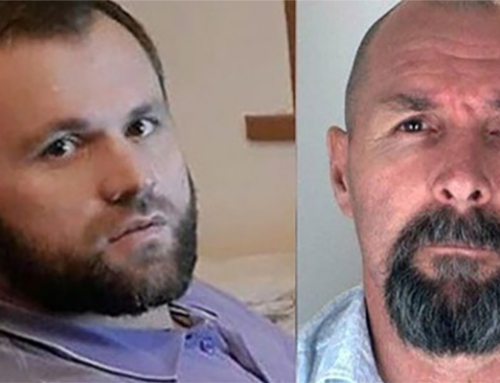
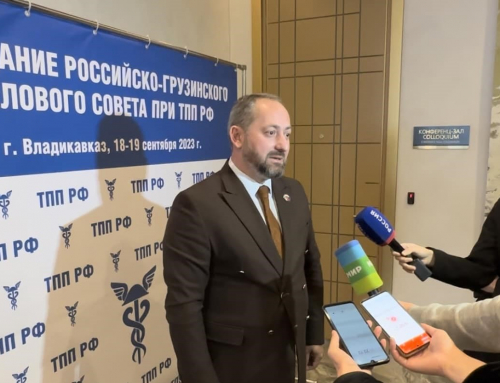
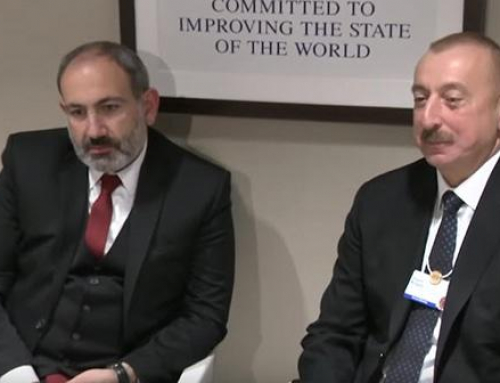
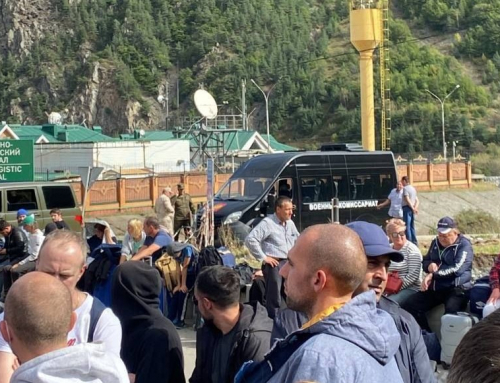
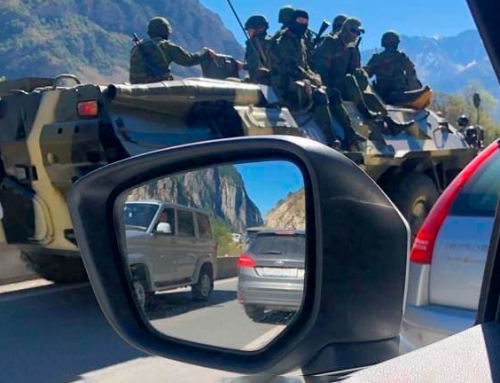
Leave A Comment
You must be logged in to post a comment.